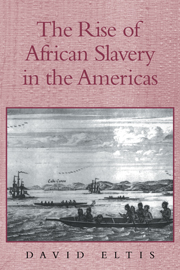Book contents
- Frontmatter
- Contents
- List of Tables
- List of Maps
- Preface
- Abbreviations
- Chapter 1 Slavery and Freedom in the Early Modern World
- Chapter 2 The English, the Dutch, and Transoceanic Migration
- Chapter 3 Europeans and African Slavery in the Americas
- Chapter 4 Gender and Slavery in the Early Modern Atlantic World
- Chapter 5 Productivity in the Slave Trade
- Chapter 6 Africa and Europe in the Early Modern Era
- Chapter 7 The African Impact on the Transatlantic Slave Trade
- Chapter 8 The English Plantation Americas in Comparative Perspective
- Chapter 9 Ethnicity in the Early Modern Atlantic World
- Chapter 10 Europe and the Atlantic Slave Systems
- Epilogue on Abolition
- Appendices
- Maps
- Sources and Bibliography
- Index
Epilogue on Abolition
Published online by Cambridge University Press: 05 August 2012
- Frontmatter
- Contents
- List of Tables
- List of Maps
- Preface
- Abbreviations
- Chapter 1 Slavery and Freedom in the Early Modern World
- Chapter 2 The English, the Dutch, and Transoceanic Migration
- Chapter 3 Europeans and African Slavery in the Americas
- Chapter 4 Gender and Slavery in the Early Modern Atlantic World
- Chapter 5 Productivity in the Slave Trade
- Chapter 6 Africa and Europe in the Early Modern Era
- Chapter 7 The African Impact on the Transatlantic Slave Trade
- Chapter 8 The English Plantation Americas in Comparative Perspective
- Chapter 9 Ethnicity in the Early Modern Atlantic World
- Chapter 10 Europe and the Atlantic Slave Systems
- Epilogue on Abolition
- Appendices
- Maps
- Sources and Bibliography
- Index
Summary
The first step perhaps was the idea that the enslavement of Europeans anywhere in the world was a wrong that needed to be righted. The belief that members of one's own community were not appropriate subjects for enslavement was not confined to Europe. Roman, Greek, Islamic, and indeed all other societies developed similar attitudes. But Europeans began to back this up with substantial resources during the early modern period. As noted in Chapter 3, Spanish and Portuguese religious orders began working for the release of captives in the sixteenth century – the first such efforts on a large scale. Further north almost every coastal town in the Netherlands had a slave fund for redeeming Dutch sailors from the galleys of the Barbary states by the seventeenth century. European seafaring states signed a series of treaties with North African powers and the Ottoman Turks to safeguard ships and crew from capture and enslavement. Most provided for the issuing of safe-conduct passes to merchant ships. The irony that among the main beneficiaries of such arrangements were Dutch and English slave traders on their way to Africa appears to have escaped historians and then contemporaries, among them the Earl of Inchquin, who was held captive in Algiers before becoming governor of the slave colony of Jamaica. When the passes proved ineffective and seamen were captured and enslaved, petitions to the British government seeking their release demanded action in the cause of “Christian charity and humanity” – long before abolitionists began to invoke similar principles.
- Type
- Chapter
- Information
- The Rise of African Slavery in the Americas , pp. 281 - 284Publisher: Cambridge University PressPrint publication year: 1999



